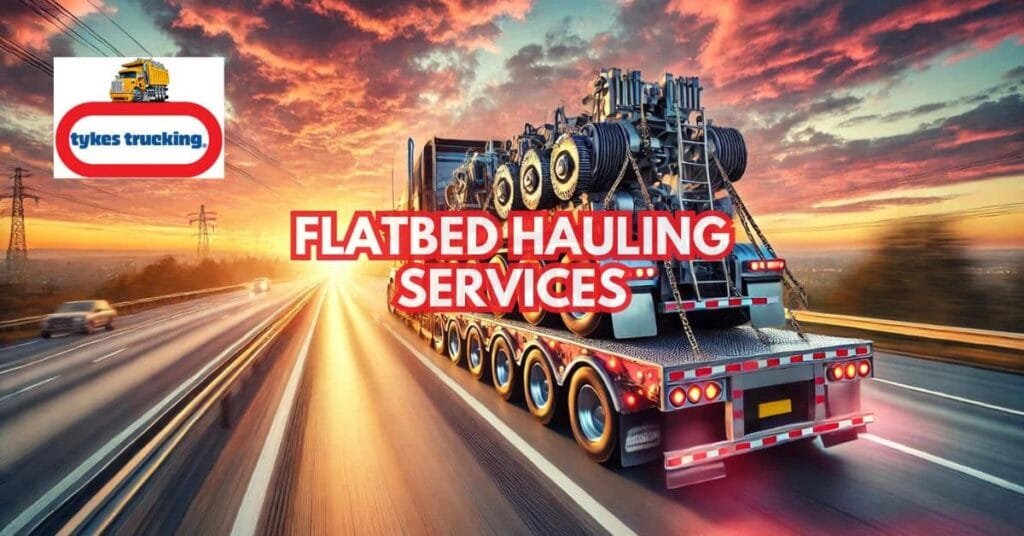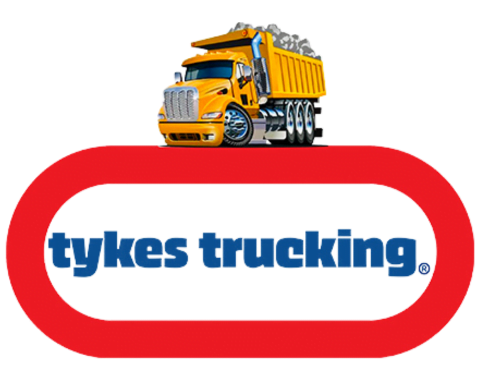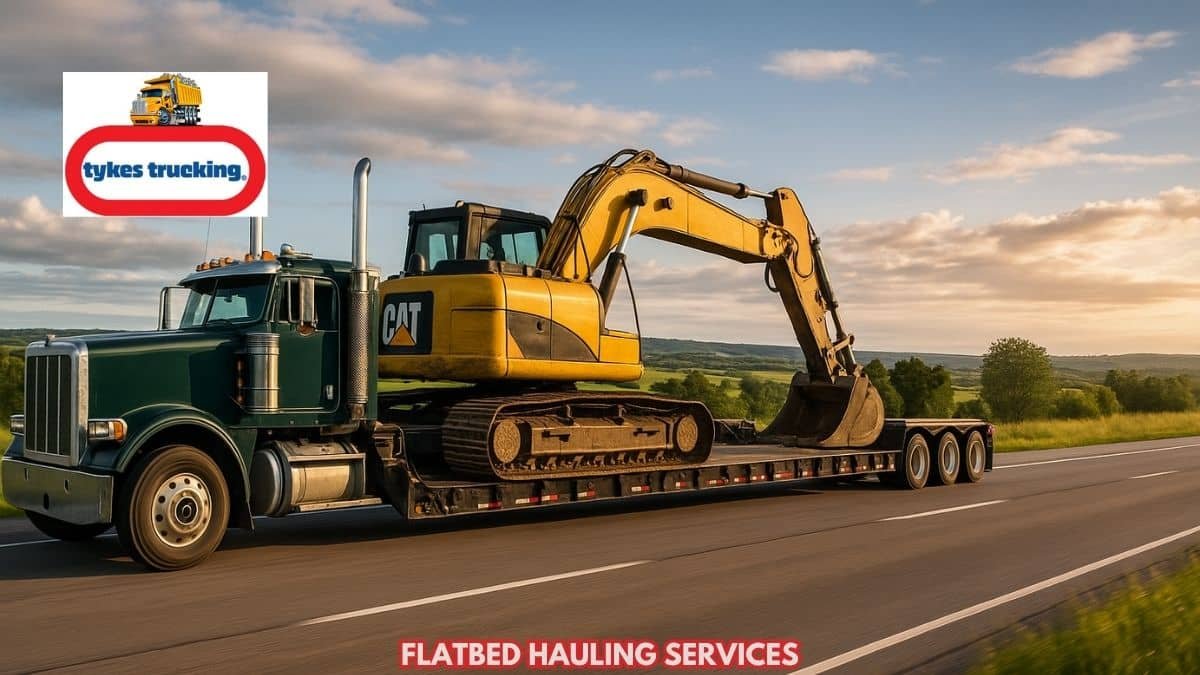Flatbed hauling services help move large, heavy, or oddly shaped cargo that cannot fit inside standard trailers.
They are widely used in industries like construction, manufacturing, and agriculture, where oversized materials and equipment must be transported safely.
Because flatbeds have open platforms, they allow easy loading and unloading from any side, making them ideal for bulky or uneven loads.
Choosing the right type of trailer and planning each trip carefully are important for keeping cargo secure and on schedule.
By understanding how flatbed hauling services work and when to use them, shippers can make smarter decisions that save time and money.
1. Types of Cargo Best Suited for Flatbed Hauling
Flatbed hauling is best for cargo that is too large, wide, or unevenly shaped to fit inside an enclosed trailer.
A flatbed truck can carry items such as heavy machinery, construction equipment, steel beams, and long pipes that need open loading space.
It is also useful for transporting lumber and large building materials that must stay flat and supported during travel.
Many shippers use flatbed freight for goods that require cranes or forklifts, since these machines can load items from any side.
This type of transport also reduces the need to break apart large items, saving time and handling costs.
A flatbed truck allows better access when loading or unloading bulky cargo in tight areas.
Because of its open design and flexibility, flatbed freight is one of the most practical choices for oversized or irregular loads.
🚚 How Expedited Trucking Services Save the Day and Your Deadlines
2. Understanding Different Flatbed Trailer Types
Not all flatbed trailers are the same, and each type is designed to handle a specific kind of load.
A standard flatbed is the most common and is used by many flatbed carrier companies for large or wide cargo that does not need special adjustments.
A step-deck or drop-deck trailer sits lower to the ground and is used for tall machines that must stay under height limits during transport.
A double-drop or lowboy trailer is chosen for extra-heavy or tall equipment because its low center of gravity makes travel safer and more stable.
For very long items, a stretch or extendable flatbed provides the extra length needed to move beams, pipes, or long machinery.
A skilled flatbed carrier selects the right trailer type based on the size, weight, and shape of the cargo to ensure safe and efficient transport.
🚚 How to Choose the Right Trucking and Hauling Company
3. Advantages of Flatbed Flexibility in Loading and Unloading
Flatbeds offer significant advantages in terms of flexibility during loading and unloading, which is especially important for oversized or irregularly shaped cargo.
The ability to load from any direction, whether from the side, top, or rear, greatly simplifies the process, particularly when dealing with heavy machinery or construction materials.
Forklifts and cranes can be used without restrictions, saving time and reducing the need for special equipment.
In some cases, this ease of access can lead to shorter loading times and reduced labor costs.
For shippers dealing with complex loads, flatbeds provide unmatched convenience.
🚚 Why Hydraulic Cylinder for Dump Trucks Is Essential for Heavy-Duty Operations
4. How Weather Conditions Affect Flatbed Shipping Decisions
Since flatbed trailers leave cargo exposed to the elements, weather conditions must be carefully considered when choosing this service.
Rain, snow, and extreme winds can damage sensitive materials or cause safety issues during transit.
Many shippers opt to use tarps or specialized coverings to protect goods, but this adds time and cost to the shipping process.
In regions prone to harsh weather, careful scheduling and route planning are critical to ensuring the cargo remains secure and undamaged.
Shippers must always weigh the risks of exposure when deciding whether flatbed hauling is appropriate for their goods.
🚚 How Many Tons of Gravel in A Dump Truck

5. Evaluating Distance and Delivery Time for Flatbed Services
When using flatbed hauling services, both distance and delivery time need to be carefully evaluated to ensure efficient transport.
Longer distances can present challenges, such as the need for additional stops to check and secure cargo.
Flatbed loads may also require permits for certain routes, which can delay the delivery if not planned in advance.
Furthermore, cargo protection measures may be needed on long trips, especially when weather conditions vary across regions.
Shippers should consider these factors to balance delivery speed with the safety and integrity of their cargo.
🚚 How to Choose the Right Service for Aggregate Delivery in Marikina
6. Understanding Regulatory Compliance for Oversized Cargo
Flatbed hauling services often involve moving oversized or overweight cargo that must meet specific government rules.
Each state or region has its own size and weight limits, and shippers may need special permits or police escorts for very large loads.
A trucking company must carefully plan routes to avoid restricted bridges or roads that cannot handle heavy freight.
Carriers are also required to display proper signage and follow time-of-day travel rules to ensure safe movement on public highways.
Failure to follow these regulations can lead to fines, delays, or even the impoundment of cargo.
A knowledgeable carrier works closely with state transportation offices to get the needed approvals before the shipment begins.
Strong communication between the shipper, trucking company, and logistics team helps prevent mistakes and ensures compliance.
By following these steps, shippers can reduce risks and keep the transport process smooth and lawful.
7. Cost-Effectiveness of Flatbed Hauling Compared to Other Options
Flatbed hauling can be a cost-effective solution, especially for large or irregularly shaped cargo that would be difficult to transport in standard trailers.
Since flatbeds allow for easier and faster loading and unloading, labor costs and time spent at the loading dock are often reduced.
Additionally, oversized or bulky items can be moved without the need for disassembly, avoiding extra handling fees.
When compared to more restrictive transportation options, flatbed hauling may also eliminate the need for additional trips, further reducing costs.
However, shippers must weigh these savings against potential expenses like permits and weather protection.
🚚 How the Weight Of A Dump Truck Affects Its Performance and Safety
8. Safety Considerations When Using Flatbed Services
Safety is paramount when using flatbed hauling services, as the open nature of the trailer means cargo must be properly secured to avoid accidents.
Loads that are improperly strapped or unbalanced can shift during transit, posing serious risks to road safety.
Flatbeds often require the use of heavy-duty straps, chains, and tarps to ensure that the cargo stays in place, even in adverse weather conditions.
Regular safety checks throughout the journey are necessary, especially for long hauls.
Shippers must work closely with their transport provider to ensure all safety measures are followed for the protection of both the cargo and other drivers on the road.
🚚 Why Tarp Systems For Dump Trucks Are Essential for Preventing Load Spillage
9. The Importance of Specialized Equipment for Flatbed Transport
Specialized equipment is often needed when using flatbed hauling services, depending on the type of cargo being transported.
For example, cranes and forklifts are commonly used to load and unload heavy machinery or large construction materials.
In addition, tarps, straps, and chains are crucial for securing and protecting loads from shifting or weather damage.
Some loads may even require custom brackets or frames to ensure safe transport.
Using the right equipment not only ensures the safety of the cargo but also reduces the risk of delays caused by improper handling.
🚚 How Dump Truck Training Can Improve Job Site Safety
10. Industry-Specific Needs for Flatbed Hauling Services
Certain industries, such as construction, agriculture, and manufacturing, rely heavily on flatbed hauling services to meet their shipping needs.
Construction projects often involve moving heavy materials like steel beams, lumber, and equipment, which are best suited for flatbeds due to their size and weight.
In agriculture, flatbeds are used to transport large farming equipment, irrigation pipes, or bulky materials like hay bales.
Manufacturing industries may also need flatbeds to move large machinery or components that don’t fit standard trailer sizes.
Each industry has its own specific requirements, making flatbed hauling an essential service for these sectors.
🚚 Expert Dirt and Debris Hauling Services
11. Tips for Choosing a Reliable Flatbed Hauling Provider
Selecting the right flatbed hauling provider is essential for ensuring safe, efficient transport of your cargo.
Shippers should look for providers with extensive experience handling oversized or irregularly shaped loads, as these require special care.
It’s also important to evaluate the provider’s fleet and equipment to ensure they have the necessary resources for your shipment.
Checking customer reviews and asking for references can give insight into the company’s reliability and safety record.
Lastly, transparency in pricing and communication helps avoid unexpected costs and ensures a smoother shipping experience.
🚚 Low-Cost Dump Truck Solutions in Marikina City
💡 Conclusion
Flatbed hauling services provide an effective solution for transporting large, heavy, or irregularly shaped cargo that doesn’t fit in standard trailers.
By considering key factors such as safety, regulatory compliance, and weather conditions, shippers can determine when flatbed hauling is the best option.
Choosing the right provider with the necessary equipment and expertise is critical to ensuring smooth and cost-effective transport.
Specialized equipment and industry-specific needs further highlight the importance of flatbed services in many sectors.
With proper planning and execution, flatbed hauling can significantly improve the efficiency and safety of your shipping operations.
❓ FAQs
1. What kinds of cargo are best for flatbed hauling services?
Flatbed hauling services are best for loads that are large, heavy, or irregular in shape.
These include items like construction materials, machinery, steel beams, and lumber.
If the cargo cannot fit inside a standard enclosed trailer, a flatbed is often the safest and most practical choice.
2. How do I know which type of flatbed trailer to use?
The type of trailer depends on the size, shape, and weight of your cargo.
A standard flatbed works for most loads, while step-deck, double-drop, or extendable trailers are used for taller or longer items.
Talking with your transport provider can help you choose the right trailer for your shipment.
3. What safety steps are important during flatbed hauling?
Cargo must be properly secured using straps, chains, or tarps to prevent shifting during travel.
Drivers and shippers should check the load at the start and during long trips to make sure it stays tight and balanced.
Following these safety steps helps protect both the cargo and other drivers on the road.
4. Do weather conditions affect flatbed shipments?
Yes, weather plays a big role because the cargo is exposed on the trailer.
Rain, snow, and wind can damage materials or cause safety risks, so many shippers use tarps or delay shipments when conditions are poor.
Careful planning helps keep the cargo dry, stable, and safe during transport.
5. What should I consider when choosing a flatbed hauling provider?
Look for a company with experience moving oversized loads and a strong safety record.
Make sure they have the right equipment, proper permits, and insurance coverage for your shipment.
Clear communication and fair pricing are also signs of a reliable flatbed hauling service.
😉 Our Services
Tykes Trucking Services specializes in delivering aggregates and providing reliable hauling services for your construction and transport needs.
We ensure timely and efficient deliveries to keep your projects on track.
With a dedicated team and well-maintained fleet, we handle a wide range of hauling requirements.
For inquiries or bookings, contact us at 0917-543-5019, reach out via our Facebook page, or use the contact form on our website.
Let us handle your hauling needs with professionalism and care!

